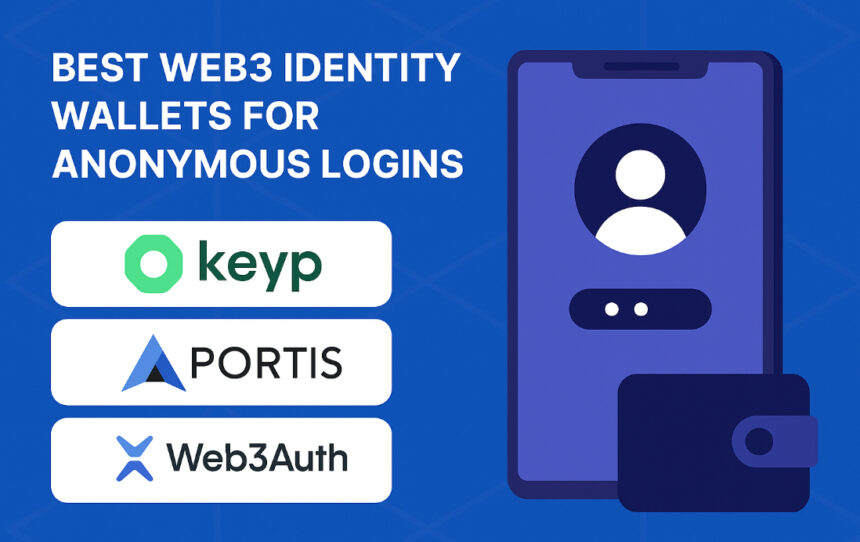Best Web3 Identity Wallets for Anonymous Logins to many different decentralized platforms. Users are now able to log in seamlessly and privately without the need for emails, passwords, or personal information.
Users can log in and access dApps, NFT platforms and DeFi services through wallet authentication. The top Web3 Identity wallets for anonymous logins are the most secure, user friendly, and provide the most multi wallet support to give users the most digital autonomy.
Key Criteria When Choosing a Web3 Wallet for Anonymous Logins
While searching for a Web3 wallet that allows anonymity or pseudonymity (not linking your real name), consider these top factors:
Non-Custodial Key Management — You alone hold the private keys and/or seed phrase. No one else can access your wallet. This means that you would not have to go through any KYC or identity verification.
Setup No User-Identifiable Information — The wallet setup should be the user’s choice as to when or whether to provide any sort of name, email, identification, or phone number.
Flexible Across Chains and/or dApps — If you are likely to make transactions on several dApps that operate on different layer or main blockchains, you should consider a wallet that is either multi-chain or EVM-compatible.
Security and Wallet Hygiene — You need to keep your seed phrase secure and stored offline, as well as being careful of phishing scams and keeping the wallet software updated.
User Interface and Overall Usability for Non-Experts — Fewer mistakes are made with systems that provide good user experience and have straightforward UI, especially in aspects of network selection, providing gas fees, and warning of failures or problematic transactions.
Having a Good Understanding of the Limitations — No full anonymity to blockchaining but majority pseudonymity can be achieved. While the wallet can be anonymous, use of blockchain for transactions exposes them to the public.
Key Point
| Wallet | Key Features |
|---|---|
| MetaMask | Browser & mobile wallet, supports Ethereum & EVM chains |
| Trust Wallet | Multi-chain support, built-in DEX, NFT storage |
| Rabby Wallet | Designed for DeFi, seamless dApp connections |
| Safe (formerly Gnosis Safe) | Multi-sig wallet, DAO treasury management |
| Coinbase Wallet (non-custodial) | Separate from exchange, supports NFTs & DeFi |
| Argent Wallet | Smart contract wallet, social recovery |
| Zerion Wallet | DeFi portfolio tracker + wallet |
| Rainbow Wallet | Ethereum-focused, NFT-friendly |
| Frontier Wallet | Multi-chain DeFi wallet, staking support |
| XDEFI Wallet | Cross-chain browser wallet |
1. MetaMask
MetaMask has gained notoriety among users without custodianship functionalities for being non-custodial and enabling users to connect to several dApps without indulging in KYC verification.
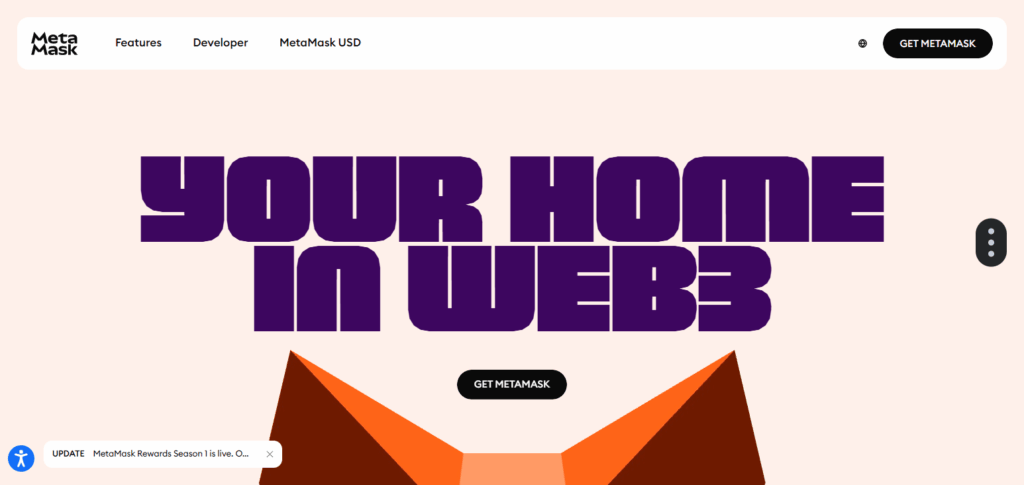
You have total autonomy and control over the private keys, permitting pseudonymous accessibility to Ethereum and other EVM Network. Being a part of the Best Web3 Identity Wallets for Anonymous Logins, MetaMask allows users to authenticate without disclosing a true identity, as access can be obtained by message signing.
Through its mobile application and browser extension, users can seamlessly onboard the Web3 ecosystem and utilize several assets including tokens, NFTs, and custom networks. MetaMask systems are aligned to sustain user privacy.
MetaMask – Pros & Cons
Pros
- The number one wallet choice on Web3 dApps
- Convenient as a browser extension and as a mobile application
- Private self-hosted wallet, no KYC, no custodial
- Available ecosystem, modules, and community
- Custom networks, EVM compatible chains
Cons
- While it doesn’t support Bitcoin, also a non-EVM native missing token
- Users need to be cautious as it has been a target as phishing and scam risk
- Finding ways to set gas fees can be confusing.
- Minimal analytics on portfolio, NFTs
2. Trust Wallet
Trust Wallet Inc. is a multi-chain, non-custodial cryptocurrency wallet. Trust Wallet is ideal for people who appreciate private and decentralized access and does not require account registration, email, or identification and is thus ideal for pseudonymous use, with more than 60 blockchains supported.
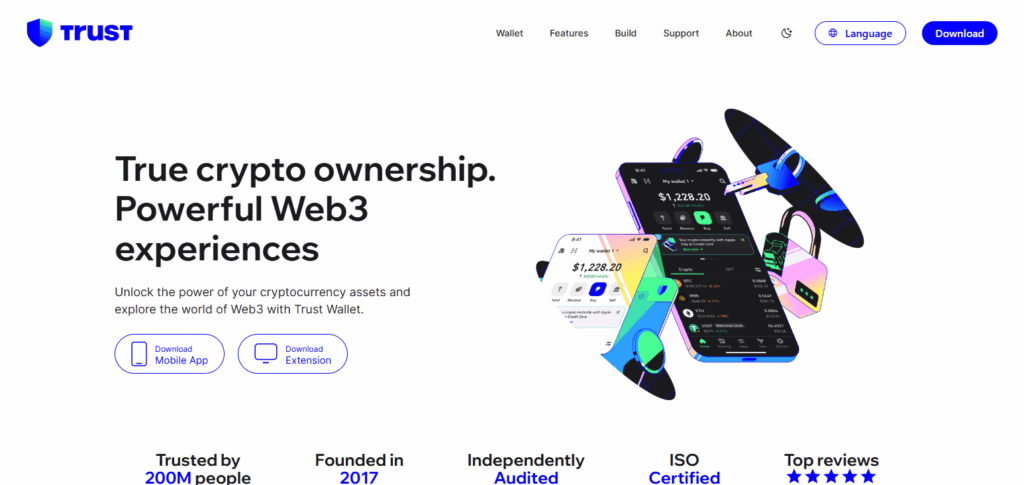
Users can conveniently stake, manage NFTs, and access a decentralized application (dApp) browser. Users can access web decentralized applications (dApps) through Trust Wallet using just a wallet address, with no on-chain identity information tied to it, earning Trust Wallet recognition as one of the Best Web3 Identity Wallets for Anonymous Logins. This set-up is flexible, private, and secure.
Trust Wallet – Pros & Cons
Pros
- Capable of 60+ blockchains and 1,000+ tokens
- Targets mobile users and is good for beginners
- Allows staking and has a dApp browser
- KYC-free with no personal data collection
- Excellent support of NFTs, cross-chains
Cons
- Mobile only, no desktop access, and few extension features
- Lacks robust selection of DeFi tools as others.
- Existence of power users with multiple accounts will find it less suitable
- Some networks can be tricky to set up manually.
3. Rabby Wallet
Rabby Wallet is a new and highly satisfactory privacy-friendly web3 wallet created by DeBank. Rabby Wallet is customized to work with Ethereum and EVM chains. It detects the appropriate networ and transacts safely and error-free.
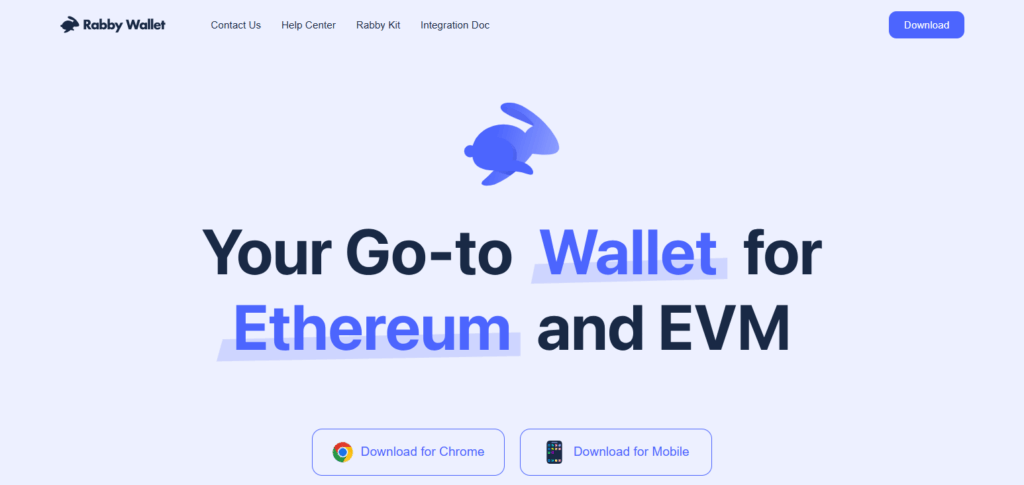
Along with the other entries in the Best Web3 Identity Wallets for Anonymous Logins, Rabby Wallet does not store any personal information, allowing users to login to dApps anonymously.
The wallet is able to simulate a transactions, increasing the number of users.This wrist and safety checks, and anomymous login, make Rabby a great replacement for Metamask for the private and dependable users.
Rabby Wallet – Pros & Cons
Pros
- Focus on DeFi and dApps.
- Highest quality simulation of a transaction to ensure safety.
- Automatic switches networks to ease of use.
- Self-hosted non-custodial wallet.
- More user-friendly compared to MetaMask.
Cons
- Only supports EVM Networks
- Smaller ecosystem compared to MetaMask
- No mobile version (browser-only)
- Newer to the space( manifesting as fewer integrations)
4. Coinbase Wallet
Coinbase Wallet works independently from the Coinbase exchange. As a non-custodial, standalone Web3 wallet, it does not require KYC and personal information to function, helping users remain pseudonymous across blockchains.
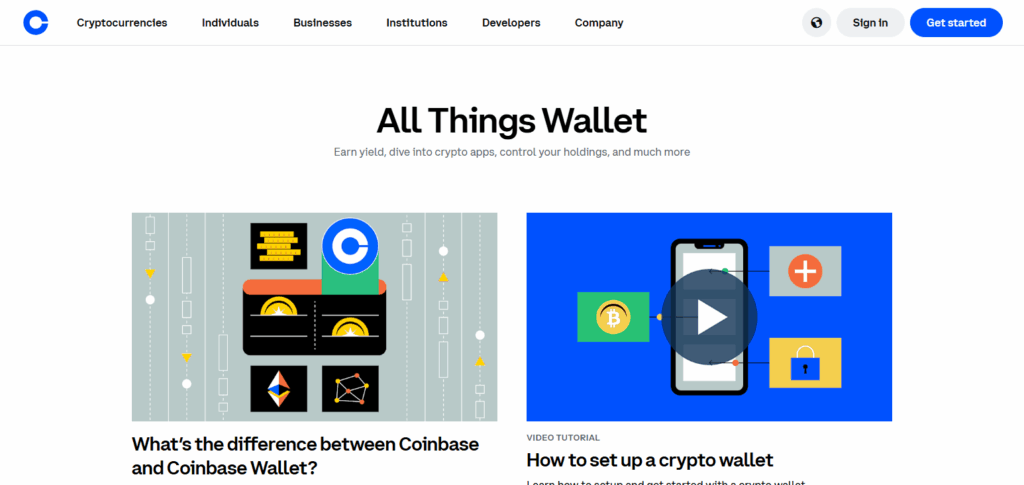
Users, unlike centralized accounts, have full control of their private keys and can access their and dApps, tokens, and NFTs in a fully decentralized manner.
Coinbase Wallet is one of the Best Web3 Identity Wallets for Anonymous Logins. Users can sign a transaction to connect to a Web3 platform without revealing their identity. It seamlessly balances accessibility and privacy.
Coinbase Wallet -Pros & Cons
Pros
- Non-custodial, completely separate from Coinbase exchange
- No KYC asked when creating a wallet
- Supports Ethereum, EVM networks, Solana, and a few others
- Nice user interface, ideal for beginners
- Security from a trusted brand
Cons
- Some users do get confused and think it is the custodial version
- They do collect analytics on how the app is being used, unless you turn it off
- Lacking in some of the more complex DeFi functionality others possess
- Less customization when compared to MetaMask
5. Argent Wallet
Argent Wallet is a phenomena designed to help facilitate the onboarding of new users. As a smart-contract, non-custodial wallet, Argent eliminates the worries of seed phrases and memory loss through a service focused on social recovery through allocated guardians.
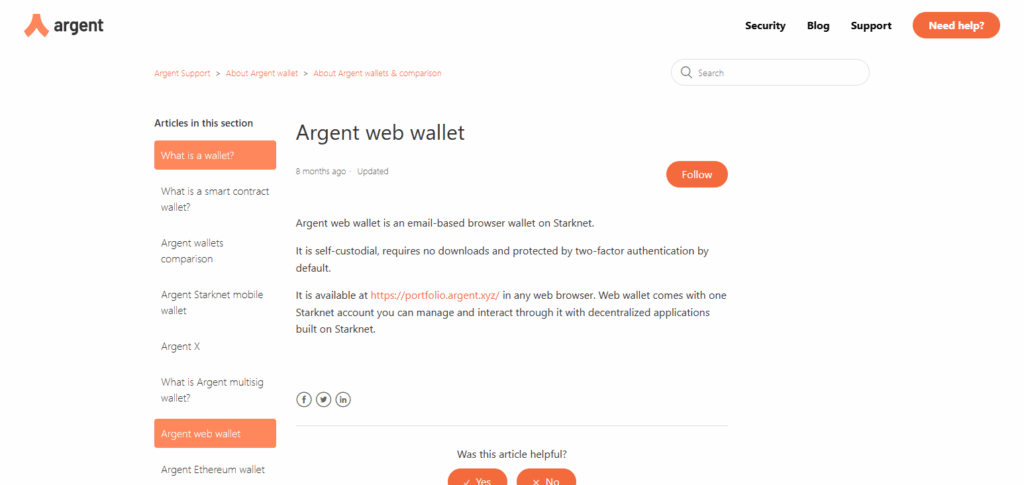
The wallet is multifunctional, serving Ethereum, zkSync, and multiple new scaling networks. Argent offers pseudonymous logins through secure signatures to Web3 Applications.
Argent retains privacy through spending limits and advanced strategy wallets that incorporate yield generating saving wallets along with full DeFi access with customized spending limits. Argent‘s secure architecture is likely the primary driver for design becoming the industry standard for privacy in Web3.
Argent Wallet -Pros & Cons
Pros
- Really good security features for a smart contract wallet
- No seed phrase, as they offer social recovery
- Great built in DeFi functionalities, as well as spending limits on those DeFi integrations
- Works well on zkSync Era and on L2
- No custodial supervision, your privacy is 100% intact
Cons
- Only supports Ethereum and a few of the L2 networks
- Smart wallet design means that fees may be a little higher
- If you are a cross chain user, it may not be the best
- They are not as integrated with the rest of the Ethereum ecosystem as others are
6. Zerion Wallet
Zerion Wallet operates on its own multi-chain smart wallet designed to manage portfolios, NFTs, and DeFi assets on numerous blockchains. The wallet focuses on privacy and no personal information or KYC is needed to set it up.
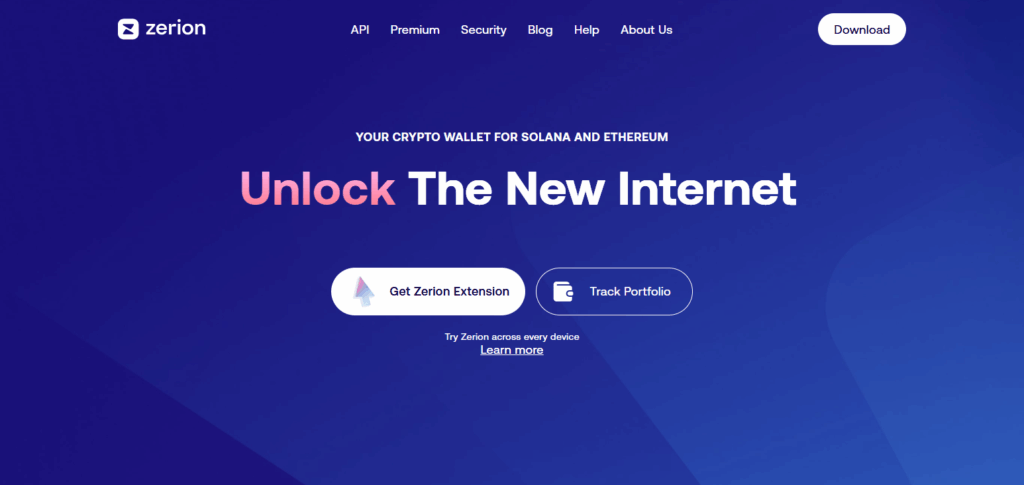
The wallet transfers and tracks your transactions in real time, syncing mobile and browser. The wallet is one of the Best Web3 Identity Wallets for Anonymous Logins because you can access dApps with just a wallet signature and no other personal information is needed.
With a generous suite of DeFi interfacing management, Zerion is one of the most privacy-respecting wallet providers in Web3.
Zerion Wallet – Pros & Cons
Pros
- Great tracking and data collection across chains.
- A multi-chain wallet with a nice interface
- Browser and mobile compatible
- No personal details required – complete privacy
- Transaction data available instantly
Cons
- Not all networks are fully supported yet
- Fewer integrations than MetaMask
- It’s more focused on tracking than complex DeFi functions
- Not all of the specialized DeFi wallet functions are available
7. Rainbow Wallet
It’s a smooth and painless experience when interacting with Rainbow Wallet. Rainbow Wallet is a unique wallet with a contemporary user interface and a seamless experience. Being non-custodial, Rainbow Wallet means no linking any personal documentation, allowing more privacy and freedom.

The wallet is a big supporter of assets across the Web 3.0 economy, which includes NFTs, DeFi, and DAOs. Being one of the best wallets for anonymous Web 3.0 logins, the wallet also allows signature logins. Rainbow Wallet is an amazing wallet for a user looking for a super simple and stealth way into the world of Web 3.0.
Rainbow Wallet – Pros & Cons
Pros
- Simple onboarding and fast access to dApps.
- Non-custodial and private.
- Offers excellent NFT collection and display.
- Elegant and user-friendly interface.
Cons
- Limited multichain functionality.
- Focuses primarily on Ethereum.
- Lacks power suite features desired by some DeFi users.
- Newly launched browser extension and lacks some features.
8. Frontier Wallet
Frontier Wallet describes itself as a non-custodial and mobile-first app with over 40 blockchains and data on DeFi, NFTs, staking, and portfolio management. Say goodbye to KYC and account signups to keep your data private, and use Fronier to interact with DeFi dApps.
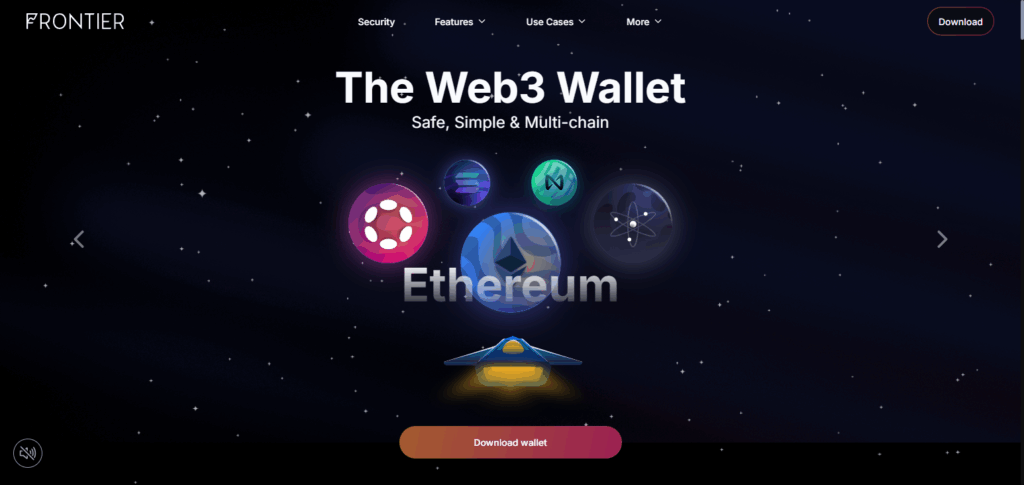
Frontier is Best Web3 Identity Wallets for ANonymous logins. These users don’t have to relinquish their identity with complex KYC and keep their identity private by simply signing with their wallet. With a large number of assets, privacy and multi-chain support, Frontier is your best chance for safe, pseudonymous Web3.
Frontier Wallet – Pros & Cons
Pros
- 40+ blockchains; outstanding multichain support.
- Privacy-friendly with no KYC; non-custodial.
- Excellent asset management and visually appealing desktop.
- Compatible with a variety of external wallets.
Cons
- Less popular than Trust Wallet and MetaMask.
- More features can be found in other desktop/browser extensions.
- Some users might find the interface confusing.
- Limited functionality for analysis may be perceived as a negative for some users.
9. XDEFI Wallet
XDEFI Wallet is a non-custodial, multi-chain wallet that is fast and secure for DeFi, NFTs, and cross-chain swaps. It works on all primary chains: Bitcoin, Ethereum, THORChain, and a few Cosmos chains.
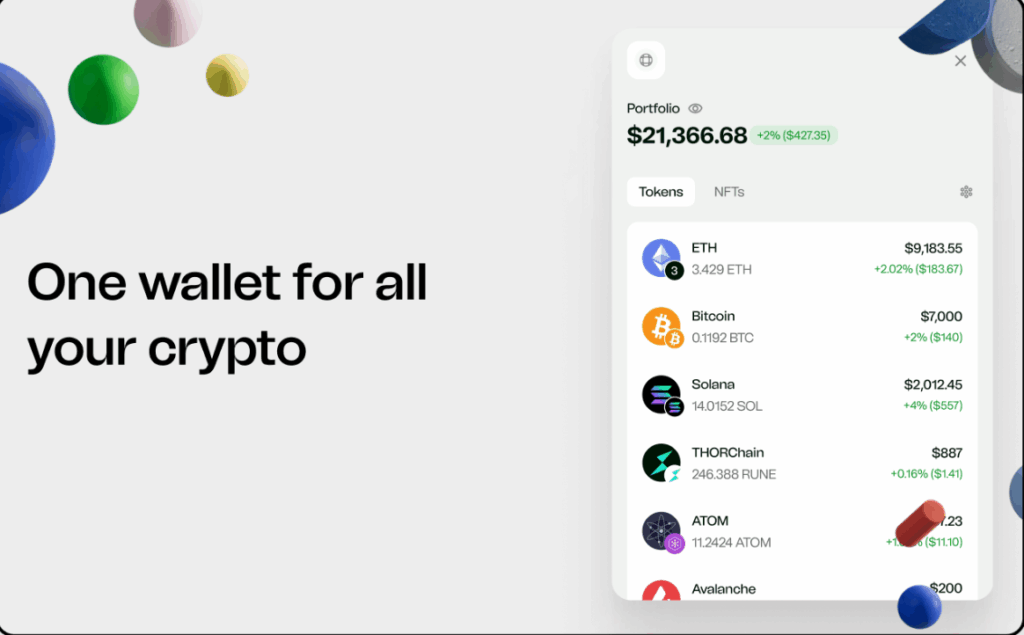
Wallet users can interact with the product anonymously, as no personal information is collected. One of the Best Web3 Identity Wallets for Anonymous Logins, XDEFI users can access dApps through wallet connection, allowing users to remain pseudonymous, as no KYC is required.
Its innovative swap engine, cross-chain compatibility, and private log-in systems to access Web3 dApps make XDEFI Wallet a fast and seamless user friendly option to huge segment of the market that renquires true digital and online anonymity.
XDEFI Wallet – Pros & Cons
Pros
- Excellent multi-chain support including Bitcoin, THORChain, Cosmos, & EVM.
- Built for cross-chain DeFi and fast swaps.
- Not custodial and anonymous-friendly login.
- Very secure and performance-focused.
- Excellent interface in both DeFi and NFTs.
Cons
- Can be more complicated for newcomers.
- Less integration compared to MetaMask.
- Manual setup may be needed for some networks.
- More focused on browser access; mobile app is still in development.
Conclusion
FAQ
What is a Web3 identity wallet?
A Web3 identity wallet is a decentralized digital wallet that stores crypto assets and lets users log into dApps anonymously using blockchain-based authentication like Ethereum, Solana, or multi-chain signatures.
Can Web3 wallets help me stay completely anonymous?
Web3 wallets enhance privacy by avoiding email, phone numbers, or KYC for login. However, full anonymity depends on how carefully you protect your address, avoid linking transactions, and use privacy-focused networks.
Which Web3 wallet is best for anonymous logins?
Wallets like MetaMask, Rabby, Trust Wallet, Rainbow, Zerion, Argent, Frontier, and XDEFI allow non-KYC, anonymous dApp authentication through wallet-signature login.
Are Web3 identity wallets safe?
Yes—when used correctly. They use private keys, seed phrases, and signature-based login. However, safety depends on the user: secure backups, avoiding phishing links, enabling hardware wallet support, and keeping devices clean.
Do these wallets store my personal information?
No. Most Web3 wallets do not collect personal details. Authentication happens through wallet addresses, not email or phone numbers.
Do I need KYC to use these wallets?
No. Web3 identity wallets like MetaMask or Rabby do not require KYC for logins. However, centralized exchanges connected to the wallet may need KYC for fiat conversions.


